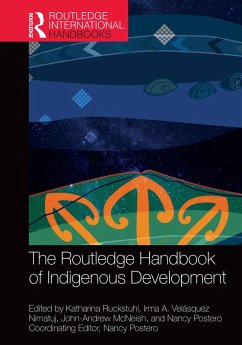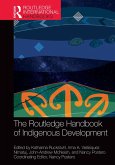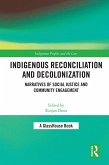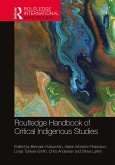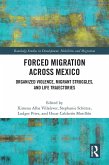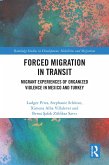The Routledge Handbook of Indigenous Development (eBook, ePUB)
Redaktion: Ruckstuhl, Katharina; Postero, Nancy; Mcneish, John-Andrew; Velásquez Nimatuj, Irma A.
45,95 €
45,95 €
inkl. MwSt.
Sofort per Download lieferbar

23 °P sammeln
45,95 €
Als Download kaufen

45,95 €
inkl. MwSt.
Sofort per Download lieferbar

23 °P sammeln
Jetzt verschenken
Alle Infos zum eBook verschenken
45,95 €
inkl. MwSt.
Sofort per Download lieferbar
Alle Infos zum eBook verschenken

23 °P sammeln
The Routledge Handbook of Indigenous Development (eBook, ePUB)
Redaktion: Ruckstuhl, Katharina; Postero, Nancy; Mcneish, John-Andrew; Velásquez Nimatuj, Irma A.
- Format: ePub
- Merkliste
- Auf die Merkliste
- Bewerten Bewerten
- Teilen
- Produkt teilen
- Produkterinnerung
- Produkterinnerung

Bitte loggen Sie sich zunächst in Ihr Kundenkonto ein oder registrieren Sie sich bei
bücher.de, um das eBook-Abo tolino select nutzen zu können.
Hier können Sie sich einloggen
Hier können Sie sich einloggen
Sie sind bereits eingeloggt. Klicken Sie auf 2. tolino select Abo, um fortzufahren.

Bitte loggen Sie sich zunächst in Ihr Kundenkonto ein oder registrieren Sie sich bei bücher.de, um das eBook-Abo tolino select nutzen zu können.
This Handbook inverts the lens on development, asking what Indigenous communities across the globe hope and build for themselves. In contrast to earlier writing on development, this volume focuses on Indigenous peoples as inspiring theorists and potent political actors who resist the ongoing destruction of their livelihoods.
- Geräte: eReader
- ohne Kopierschutz
- eBook Hilfe
- Größe: 16.84MB
Andere Kunden interessierten sich auch für
![The Routledge Handbook of Indigenous Development (eBook, PDF) The Routledge Handbook of Indigenous Development (eBook, PDF)]() The Routledge Handbook of Indigenous Development (eBook, PDF)45,95 €
The Routledge Handbook of Indigenous Development (eBook, PDF)45,95 €![Indigenous Reconciliation and Decolonization (eBook, ePUB) Indigenous Reconciliation and Decolonization (eBook, ePUB)]() Indigenous Reconciliation and Decolonization (eBook, ePUB)41,95 €
Indigenous Reconciliation and Decolonization (eBook, ePUB)41,95 €![Routledge Handbook of Critical Indigenous Studies (eBook, ePUB) Routledge Handbook of Critical Indigenous Studies (eBook, ePUB)]() Routledge Handbook of Critical Indigenous Studies (eBook, ePUB)46,95 €
Routledge Handbook of Critical Indigenous Studies (eBook, ePUB)46,95 €![Bridging Fluid Borders (eBook, ePUB) Bridging Fluid Borders (eBook, ePUB)]() Fabio SantosBridging Fluid Borders (eBook, ePUB)43,95 €
Fabio SantosBridging Fluid Borders (eBook, ePUB)43,95 €![Forced Migration across Mexico (eBook, ePUB) Forced Migration across Mexico (eBook, ePUB)]() Forced Migration across Mexico (eBook, ePUB)41,95 €
Forced Migration across Mexico (eBook, ePUB)41,95 €![Minority Rights, Feminism and International Law (eBook, ePUB) Minority Rights, Feminism and International Law (eBook, ePUB)]() Silvia GagliardiMinority Rights, Feminism and International Law (eBook, ePUB)43,95 €
Silvia GagliardiMinority Rights, Feminism and International Law (eBook, ePUB)43,95 €![Forced Migration in Transit (eBook, ePUB) Forced Migration in Transit (eBook, ePUB)]() Ludger PriesForced Migration in Transit (eBook, ePUB)41,95 €
Ludger PriesForced Migration in Transit (eBook, ePUB)41,95 €-
-
-
This Handbook inverts the lens on development, asking what Indigenous communities across the globe hope and build for themselves. In contrast to earlier writing on development, this volume focuses on Indigenous peoples as inspiring theorists and potent political actors who resist the ongoing destruction of their livelihoods.
Dieser Download kann aus rechtlichen Gründen nur mit Rechnungsadresse in A, B, BG, CY, CZ, D, DK, EW, E, FIN, F, GR, HR, H, IRL, I, LT, L, LR, M, NL, PL, P, R, S, SLO, SK ausgeliefert werden.
Produktdetails
- Produktdetails
- Verlag: Taylor & Francis
- Seitenzahl: 538
- Erscheinungstermin: 30. November 2022
- Englisch
- ISBN-13: 9781000770339
- Artikelnr.: 66109714
- Verlag: Taylor & Francis
- Seitenzahl: 538
- Erscheinungstermin: 30. November 2022
- Englisch
- ISBN-13: 9781000770339
- Artikelnr.: 66109714
- Herstellerkennzeichnung Die Herstellerinformationen sind derzeit nicht verfügbar.
Katharina Ruckstuhl is a M¿ori (Ng¿i Tahu and Rangit¿ne) Associate Professor at the Otago Business School, University of Otago, Aotearoa New Zealand. Irma A. Velásquez Nimatuj is a Maya-K'iche' Guatemalan journalist, social anthropologist, and international spokeswoman who has been at the forefront in struggles for respect for Indigenous cultures. John-Andrew McNeish is Professor of International Environment and Development Studies at the Norwegian University of Life Sciences (NMBU) in Oslo, Norway. Nancy Postero is a Professor of Sociocultural Anthropology at the University of California San Diego in the United States.
Part I - Retheorizing Development Chapter 1 - Indigenous Development as Flourishing Intergenerational Relationships Chapter 2 - Violent Colonialism: The Doctrine of Discovery and its Historical Continuity Chapter 3 - Capitalism and Development Chapter 4 - Refusing Development and the Death of Indigenous Life Chapter 5 - Two-Spirit Issues in Development Chapter 6 - The struggles of Tseltal women and Caring for the Earth: reflections on sustaining life-existence in times of the pandemic Chapter 7 - Towards a Plurinational State in Guatemala Chapter 8 - Pluck the Stars from the Sky: The Pluriverse of Adivasi Health in India Part II - Law, Self-Governance, and Security Chapter 9 - The Inca and Indigenous Development: Recalling A Native American Empire in South America Chapter 10 - Indians and the State: Negotiating Progress, Modernity, and Development in Bolivia Chapter 11 - The Constituent Process in Chile (2019-2022) from the Perspective of Indigenous Peoples Chapter 12 - Negotiating Legal Pluralism and Indigenous Development: Lessons From Bolivia Chapter 13 - Sámi Political Shifts - from assimilation, via invisibility to indigenization? Chapter 14 - Reflections on a career in Indigenous Intellectual Property Nga Taonga Tuku Iho Chapter 15 - Maya K'iche' community responses to gender violence in Santa Cruz del Quiché, Guatemala Chapter 16 - Reconceptualizing Gendered Violence: Indigenous Women's Life Projects and Solutions Chapter 17 - Indigenous Autonomy: Opportunities and Pitfalls Chapter 18 - The implementation paradox: Ambiguities of prior consultation and free, prior, and informed consent (FPIC) for Indigenous peoples' agency in resource extraction in Latin America Chapter 19 - Indigenous-led spaces in environmental governance: Implications for self-determined development Part III - Relations with the Earth Chapter 20 - The Role of Traditional Environmental Knowledge in Planetary Well-Being Chapter 21 - Building Kia i Futures: Pu uhonua o Pu uhuluhulu and Protecting Mauna Kea Chapter 22 - Place attachment, sacred geography, and solidarity: Indigenous conceptions of development as meaningful life in Mongolia and Norway Chapter 23 - Development & Territorial Control Chapter 24 - Indigenous Peoples: Extraction and Extractivism Chapter 25 - Rights of Nature: Law as a Tool for Indigenous-led Development Chapter 26 - Indigenous Peoples and International Institutions: Indigenous Peoples' Diplomacies at the United Nations Chapter 27 - Science, Technology and Indigenous Development Part IV - Engaging with Capitalism Chapter 28 - Colonial Potosí: Setting the stage for global capitalist development Chapter 29 - Mapuche's disagreements with development: a critical perspective from local spaces Chapter 30 - Nga Whai Take: Reframing Indigenous Development Chapter 31 - Chickasaw Spring: Economic Development and Resurgent Sovereignty Chapter 32 - Ser Camaleón: Indigenous Community-Based Tourism for Emancipatory Futures Chapter 33 - Indigenous Development: The Role of Indigenous Values and Traditions for Restoring Indigenous Food Sovereignty Chapter 34 - External Facilitators, Tourism, and Indigenous Development: Insights from Bangladesh Part V - Migration and City Life Chapter 35 - Indigenous Mobilities Chapter 36 - From Runas to Universal Travelers: The Case of the Kichwa Nationality-Otavalo Pueblo. A Liberating Experience of Development Chapter 37 - Imazighen of France: Developing Indigeneity in Diaspora Chapter 38 - Communal Labor and Sharing Systems Chapter 39 - Miskitu Migrants Facing the Pandemic Together in Panama Chapter 40 - Fighting and Surviving in Oaxacalifornia Chapter 41 - Lessons from Cahokia: Indigeneity and the Future of the Settler City Chapter 42 - Designing Decolonization? Architecture and Indigenous Development Chapter 43 - Urban Futurities: Identity, Place and Property Development by Indigenous Communities in the City Part VI - Looking to the Future Chapter 44 - Literatures in Indigenous Languages and Education as Development Chapter 45 - Giving Form to Indigenous Futures Through Monumental Architecture, Art, and Technology Chapter 46 - Fourth World Filmic Interventions Chapter 47 - Indigenous Online Chapter 48 - Indigenous Youth in Intercultural Universities: New Sites of Knowledge Production and Leadership Training in Mexico and Latin America Chapter 49 - Indigenous Data Futures: Empowering the Next One-Hundred Generations Chapter 50 - Climate change and sustainable development in the Pacific: the case of Samoa Part VII - Concluding Voices Chapter 51 - The Power of Our Present Futures Chapter 52 - In Cañamomo Lomaprieta, We Grow Life
Part I - Retheorizing Development Chapter 1 - Indigenous Development as Flourishing Intergenerational Relationships Chapter 2 - Violent Colonialism: The Doctrine of Discovery and its Historical Continuity Chapter 3 - Capitalism and Development Chapter 4 - Refusing Development and the Death of Indigenous Life Chapter 5 - Two-Spirit Issues in Development Chapter 6 - The struggles of Tseltal women and Caring for the Earth: reflections on sustaining life-existence in times of the pandemic Chapter 7 - Towards a Plurinational State in Guatemala Chapter 8 - Pluck the Stars from the Sky: The Pluriverse of Adivasi Health in India Part II - Law, Self-Governance, and Security Chapter 9 - The Inca and Indigenous Development: Recalling A Native American Empire in South America Chapter 10 - Indians and the State: Negotiating Progress, Modernity, and Development in Bolivia Chapter 11 - The Constituent Process in Chile (2019-2022) from the Perspective of Indigenous Peoples Chapter 12 - Negotiating Legal Pluralism and Indigenous Development: Lessons From Bolivia Chapter 13 - Sámi Political Shifts - from assimilation, via invisibility to indigenization? Chapter 14 - Reflections on a career in Indigenous Intellectual Property Nga Taonga Tuku Iho Chapter 15 - Maya K'iche' community responses to gender violence in Santa Cruz del Quiché, Guatemala Chapter 16 - Reconceptualizing Gendered Violence: Indigenous Women's Life Projects and Solutions Chapter 17 - Indigenous Autonomy: Opportunities and Pitfalls Chapter 18 - The implementation paradox: Ambiguities of prior consultation and free, prior, and informed consent (FPIC) for Indigenous peoples' agency in resource extraction in Latin America Chapter 19 - Indigenous-led spaces in environmental governance: Implications for self-determined development Part III - Relations with the Earth Chapter 20 - The Role of Traditional Environmental Knowledge in Planetary Well-Being Chapter 21 - Building Kia i Futures: Pu uhonua o Pu uhuluhulu and Protecting Mauna Kea Chapter 22 - Place attachment, sacred geography, and solidarity: Indigenous conceptions of development as meaningful life in Mongolia and Norway Chapter 23 - Development & Territorial Control Chapter 24 - Indigenous Peoples: Extraction and Extractivism Chapter 25 - Rights of Nature: Law as a Tool for Indigenous-led Development Chapter 26 - Indigenous Peoples and International Institutions: Indigenous Peoples' Diplomacies at the United Nations Chapter 27 - Science, Technology and Indigenous Development Part IV - Engaging with Capitalism Chapter 28 - Colonial Potosí: Setting the stage for global capitalist development Chapter 29 - Mapuche's disagreements with development: a critical perspective from local spaces Chapter 30 - Nga Whai Take: Reframing Indigenous Development Chapter 31 - Chickasaw Spring: Economic Development and Resurgent Sovereignty Chapter 32 - Ser Camaleón: Indigenous Community-Based Tourism for Emancipatory Futures Chapter 33 - Indigenous Development: The Role of Indigenous Values and Traditions for Restoring Indigenous Food Sovereignty Chapter 34 - External Facilitators, Tourism, and Indigenous Development: Insights from Bangladesh Part V - Migration and City Life Chapter 35 - Indigenous Mobilities Chapter 36 - From Runas to Universal Travelers: The Case of the Kichwa Nationality-Otavalo Pueblo. A Liberating Experience of Development Chapter 37 - Imazighen of France: Developing Indigeneity in Diaspora Chapter 38 - Communal Labor and Sharing Systems Chapter 39 - Miskitu Migrants Facing the Pandemic Together in Panama Chapter 40 - Fighting and Surviving in Oaxacalifornia Chapter 41 - Lessons from Cahokia: Indigeneity and the Future of the Settler City Chapter 42 - Designing Decolonization? Architecture and Indigenous Development Chapter 43 - Urban Futurities: Identity, Place and Property Development by Indigenous Communities in the City Part VI - Looking to the Future Chapter 44 - Literatures in Indigenous Languages and Education as Development Chapter 45 - Giving Form to Indigenous Futures Through Monumental Architecture, Art, and Technology Chapter 46 - Fourth World Filmic Interventions Chapter 47 - Indigenous Online Chapter 48 - Indigenous Youth in Intercultural Universities: New Sites of Knowledge Production and Leadership Training in Mexico and Latin America Chapter 49 - Indigenous Data Futures: Empowering the Next One-Hundred Generations Chapter 50 - Climate change and sustainable development in the Pacific: the case of Samoa Part VII - Concluding Voices Chapter 51 - The Power of Our Present Futures Chapter 52 - In Cañamomo Lomaprieta, We Grow Life
